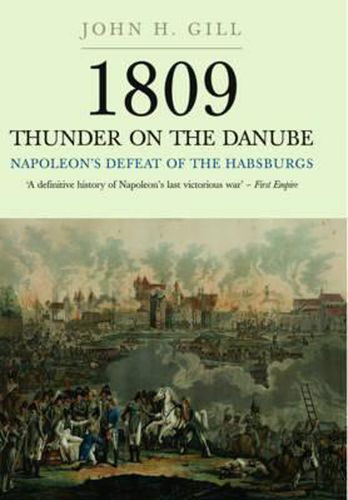Readings Newsletter
Become a Readings Member to make your shopping experience even easier.
Sign in or sign up for free!
You’re not far away from qualifying for FREE standard shipping within Australia
You’ve qualified for FREE standard shipping within Australia
The cart is loading…






The Franco-Austrian War of 1809 was Napoleon’s last victorious war. Napoleon faced the Archduke Charles, the best of the Habsburg commanders, and a reformed Austrian Army that was arguably the best ever fielded by the Danubian Monarchy. The French ultimately triumphed but the margin of superiority was decreasing and all of Napoleon’s skill and determination was required to achieve a victorious outcome. Gill tackles the political background to the war, especially the motivations that prompted Austria to launch an offensive against France while Napoleon and many of his veterans were distracted in Spain. Though surprised by the timing of the Austrian attack on the 10th April, the French Emperor completely reversed a dire strategic situation with stunning blows that he called his ‘most brilliant and most skilful manoeuvres’. Following a breathless pursuit down the Danube valley, Napoleon occupied the palaces of the Habsburgs for the second time in four years…The Austrians recovered, however, and Napoleon suffered his first unequivocal repulse at the Battle of Aspern-Essling on the shores of the Danube opposite Vienna. He would win many battles in his future campaigns, but never again would one of Europe’s great powers lie broken at his feet…In this respect 1809 represents a high point of the First Empire as well as a watershed, for Napoleon’s armies were declining in quality and he was beginning to display the corrosive flaws that contributed to his downfall five years later. His opponents, on the other hand, were improving. AUTHOR: John H. Gill (Jack), a military historian specialising in the Napoleonic era, is the author of With Eagles to Glory and the editor of ‘A Soldier for Napoleon’. He has contributed numerous papers to the Consortium on the Revolutionary Era and other academic forums. His latest work is 1809: Thunder on the Danube, just published in March 2008, which is to be the first of three volumes. An associate professor at the Near East-South Asia Center for Strategic Studies in Washington, DC, he has also published on military history and contemporary security issues relating to India, Pakistan, and other South Asian countries. 16 pages of plates and maps
$9.00 standard shipping within Australia
FREE standard shipping within Australia for orders over $100.00
Express & International shipping calculated at checkout
The Franco-Austrian War of 1809 was Napoleon’s last victorious war. Napoleon faced the Archduke Charles, the best of the Habsburg commanders, and a reformed Austrian Army that was arguably the best ever fielded by the Danubian Monarchy. The French ultimately triumphed but the margin of superiority was decreasing and all of Napoleon’s skill and determination was required to achieve a victorious outcome. Gill tackles the political background to the war, especially the motivations that prompted Austria to launch an offensive against France while Napoleon and many of his veterans were distracted in Spain. Though surprised by the timing of the Austrian attack on the 10th April, the French Emperor completely reversed a dire strategic situation with stunning blows that he called his ‘most brilliant and most skilful manoeuvres’. Following a breathless pursuit down the Danube valley, Napoleon occupied the palaces of the Habsburgs for the second time in four years…The Austrians recovered, however, and Napoleon suffered his first unequivocal repulse at the Battle of Aspern-Essling on the shores of the Danube opposite Vienna. He would win many battles in his future campaigns, but never again would one of Europe’s great powers lie broken at his feet…In this respect 1809 represents a high point of the First Empire as well as a watershed, for Napoleon’s armies were declining in quality and he was beginning to display the corrosive flaws that contributed to his downfall five years later. His opponents, on the other hand, were improving. AUTHOR: John H. Gill (Jack), a military historian specialising in the Napoleonic era, is the author of With Eagles to Glory and the editor of ‘A Soldier for Napoleon’. He has contributed numerous papers to the Consortium on the Revolutionary Era and other academic forums. His latest work is 1809: Thunder on the Danube, just published in March 2008, which is to be the first of three volumes. An associate professor at the Near East-South Asia Center for Strategic Studies in Washington, DC, he has also published on military history and contemporary security issues relating to India, Pakistan, and other South Asian countries. 16 pages of plates and maps